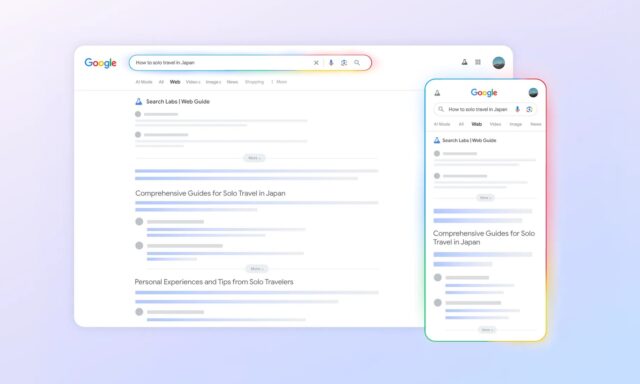Google is injecting more AI into searches with Web Guide

With interests in both web searching and AI, that Google has blended the two should surprise no one. With the launch of Web Guide, the company is taking things a step further.
At the moment, the new Web Guide is both optional and experimental. This is not necessarily a vision of what Google has in store for its search engine, but it very likely is. This time around, Google is turning to artificial intelligence to change the way in which search results are displayed.
Despite what you might well expect, Google is not using AI to conduct, manipulate or tweak searches in any way. Rather this is a way, the company says, to change the way in which search results are displayed so that they are easier to understand, and potentially more useful.
Google says that this is its attempt to use “AI to intelligently organize the search results page, making it easier to find information and web pages”. Changing the way search results look and the way they are arranged in the most popular search engine in the world could be disastrous and controversial; this is why Google is running this change as an experiment.
Web Guide, is a Search Labs experiment which you are free to try out if it is something that sounds interesting, or you can ignore it if you feel that you have enough artificial intelligence in your life at the moment.
The new experiment is different to the existing AI mode, as Google explains:
Web Guide groups web links in helpful ways — like pages related to specific aspects of your query. Under the hood, Web Guide uses a custom version of Gemini to better understand both a search query and content on the web, creating more powerful search capabilities that better surface web pages you may not have previously discovered. Similar to AI Mode, Web Guide uses a query fan-out technique, concurrently issuing multiple related searches to identify the most relevant results.
But what does this mean in practice? What will change for anyone who decides to try this out for themselves? What are the scenarios in which it could actually be helpful? Google has a suggestion that helps to make sense of what Web Guide is doing:
For example, try it for open-ended searches like “how to solo travel in Japan.” Or try detailed queries in multiple sentences like, “My family is spread across multiple time zones. What are the best tools for staying connected and maintaining close relationships despite the distance?”.
With Web Guide enabled, the results will be ordered in a way that should be more contextually aware, and ultimately more useful.
As with all of the experiments Google runs through its Search Labs playground, this early peek at Web Guide is the company gauging opinion and seeking feedback. This is, in essence, a rough sketch of an idea from Google, and anything that users have to say about it – positive and negative – could steer the direction in which it is taken in the future.
For now, there is no danger that this will become the default way in which search results are displayed. Google explains:
To start, we’ll make Web Guide accessible to opted-in users from the Web tab on Search, where you can easily switch back to standard Web tab results any time. Over time, as part of this Labs experiment, we'll also start to show AI-organized results in other parts of Search, including the "All” results tab, as we learn where they can be most useful in helping people discover the web.
So, for the vast majority of people, nothing is changing any time soon. But for those who are interested in trying out the new and the shiny, Web Guide is there as an option.
Find out more here.
